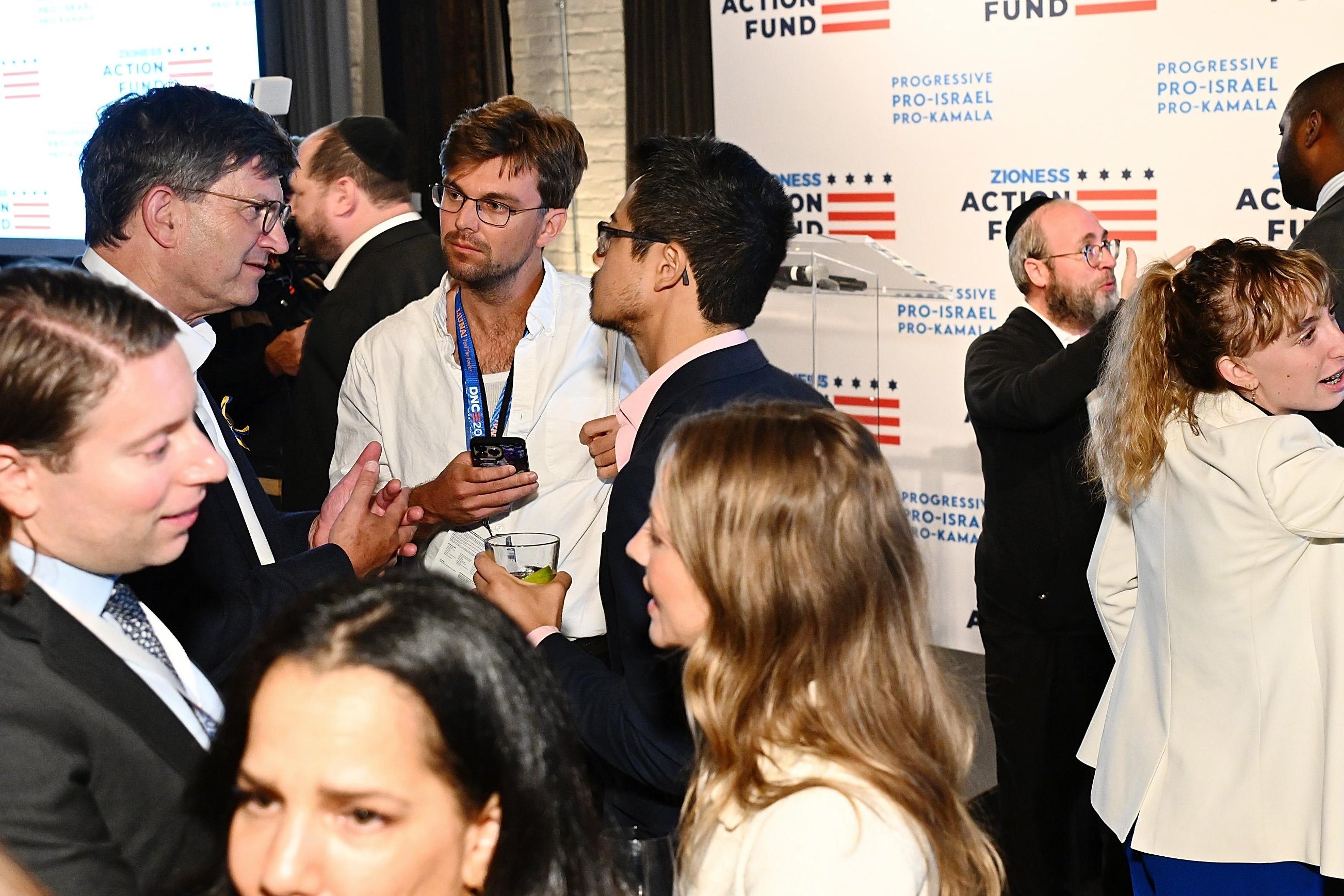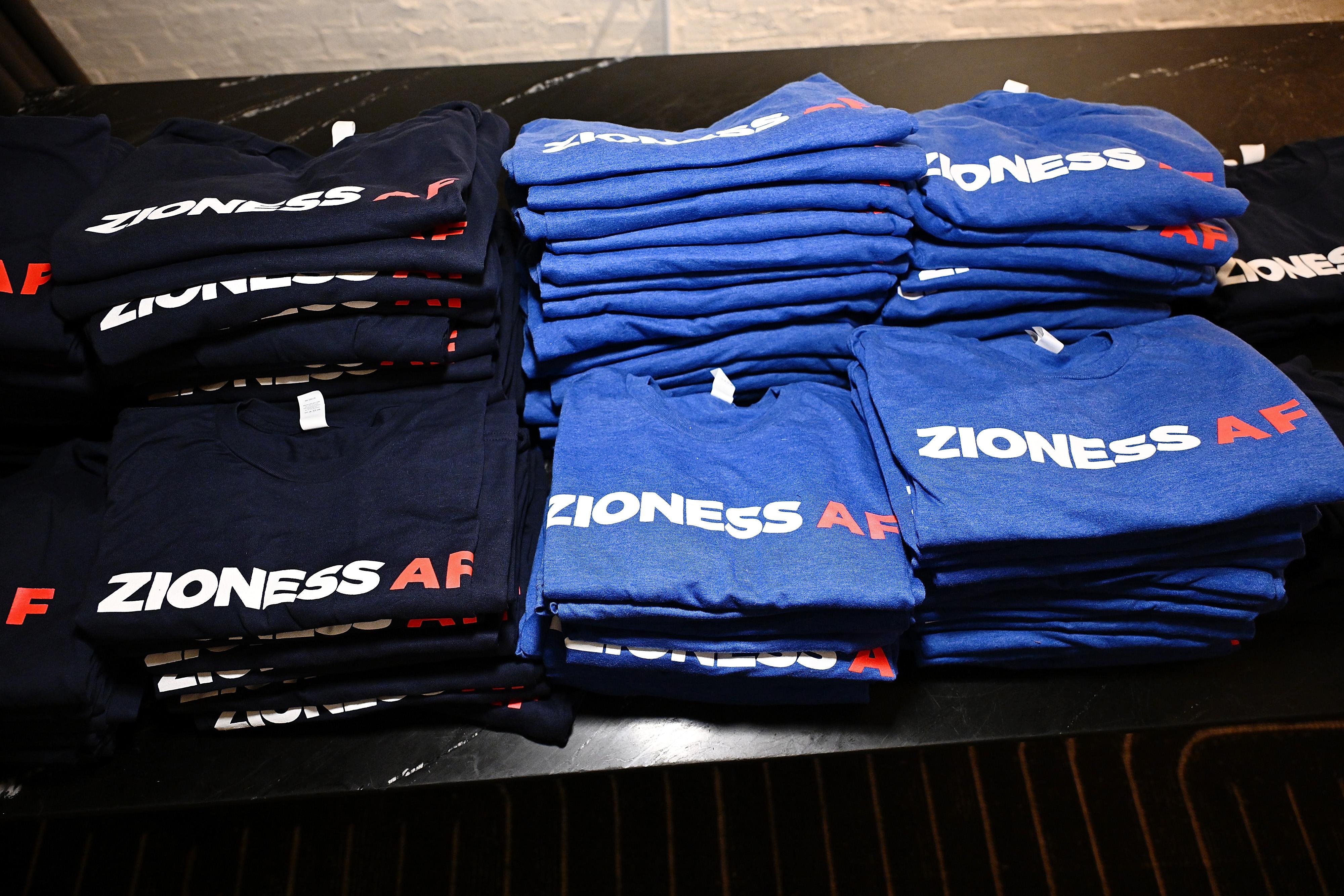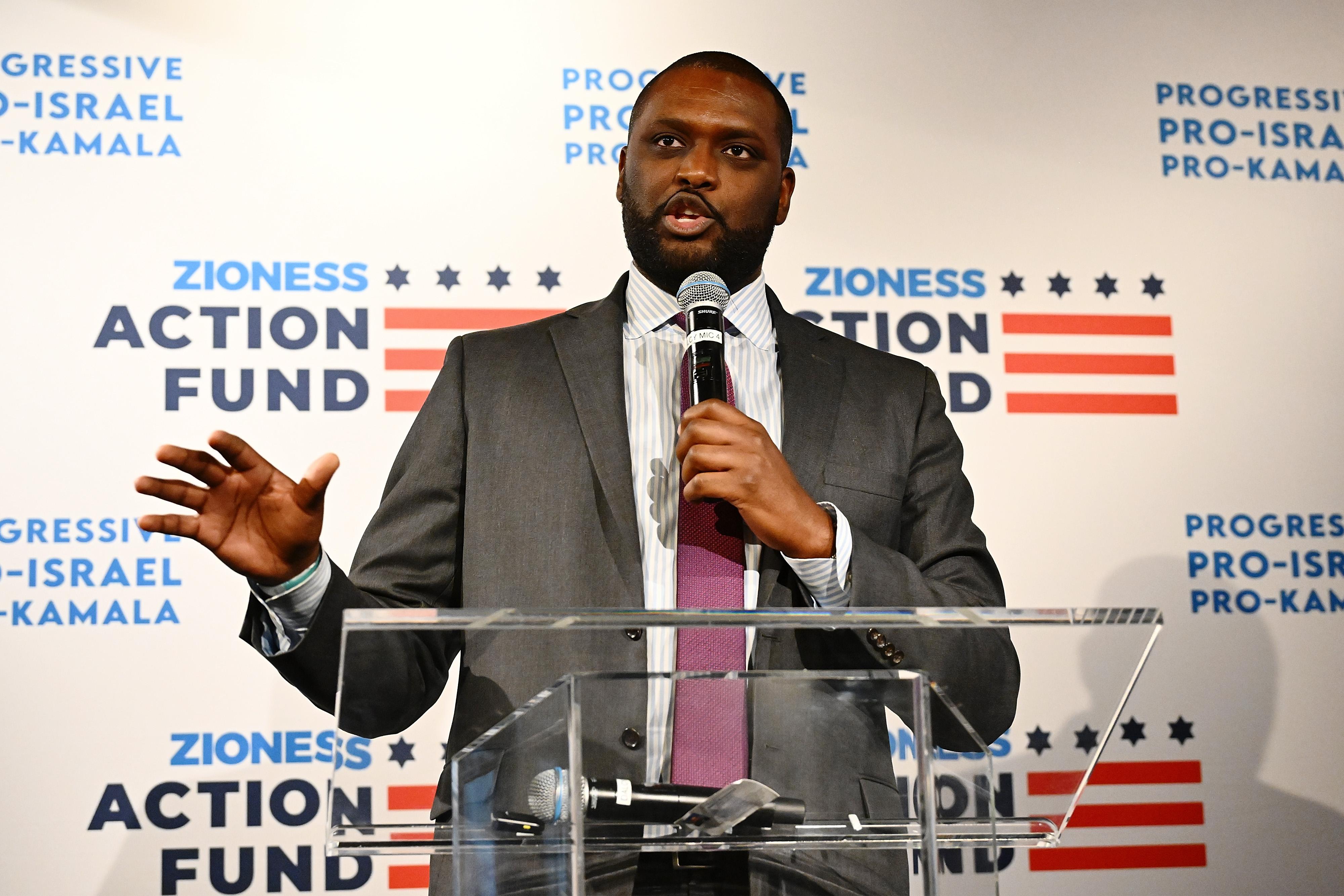I Went to a Zionist Democrats Party at the DNC. What I Saw Made Me Think There’s a Policy Shift Coming.
Alexander Sammon Aug 21, 2024

Daniel Boczarski/Getty Images
It was a quiet first day at the Democratic National Convention on the hot-button issue of Israel–Palestine. The tens of thousands of pro-Palestine protesters that organizers had anticipated ended up numbering in just the four digits. There was only one real skirmish with police outside the convention. Inside the United Center, it was largely quiet as well, with few mentions of the conflict from speakers, little in the way of Israeli or Palestinian flags, and merely one dustup between delegates.
And it was an especially quiet night at the launch party of Zioness Action Fund, the brand-new, “unabashedly progressive, unapologetically Zionist, excitedly pro-Kamala and pro-Democrats” political arm of the pro-Israel nonprofit, despite a star-studded lineup featuring members of Congress and an RSVP list that was oversubscribed. “Event is SOLD OUT!!!!! We are over capacity,” read an email sent out by the organizers.
Promised attendees included congresswomen Shontel Brown, Debbie Wasserman Schultz, Kathy Manning, and Marilyn Strickland; congressmen Dan Goldman, Jared Moskowitz, and Adriano Espaillat; and Sens. John Fetterman and Cory Booker.
When I arrived at the event, on the third floor of a swanky downtown Chicago venue, there were about three dozen people present, facing a small stage in the middle of a dark, cavernous, and mostly empty room. A pile of T-shirts that read “Zioness AF,” available in black and blue, sat unattended on a long table out front. CNN political commentator Van Jones was at the dais, finishing a speech that linked the struggle of the Black community to that of the Jewish community (and taking a weird potshot at Puerto Ricans in the process).

Daniel Boczarski/Getty Images
The lineup of speakers was chock-full of the Democratic Party’s most loyal supporters of the American Israel Public Affairs Committee and top recipients of its financial support. No one said a critical word about the organization all night.
AIPAC, the lobbying group closely allied with right-wing Israeli Prime Minister Bibi Netanyahu, has been the largest and most influential outside spender in Democratic elections in 2024, via its United Democracy Project super PAC. It is, critically, not a loyal Democratic operation. In 2022 AIPAC endorsed 109 of the 147 Republican members of Congress who had voted to overturn the 2020 election for the benefit of Donald Trump; the United Democracy Project is funded in large part by Republican megadonors. If Zioness Action Fund was meant to be a counterweight to that, there was little evidence of this. Based on the lineup, and the content of the speeches, it seemed more like a spinoff.
It was after midnight—the first night of speeches at the DNC had, famously, run long; Biden had just finished up—and things at the party were struggling to get going. Grindset impresario and assiduous podcast guest Scott Galloway loitered by the back bar.
Before the event even began, its attendees were already dropping like flies. Fetterman, the junior senator from Pennsylvania, announced Sunday that he would be skipping the DNC altogether, a shocking move for an elected Democrat at any level. He claimed he was skipping the event to spend time with his kids, a justification that has raised a number of eyebrows at the convention.
I scanned the room. I didn’t see Booker anywhere either.
The first elected official I finally saw take the stage was Wasserman Schultz, the Florida congresswoman, whose speaking slot at Monday night’s DNC had been unceremoniously scotched at the last second for time. For Wasserman Schultz, a onetime chair of the DNC herself, this party becoming her biggest stage of the night seemed not much of a consolation prize. She told the crowd that she was pushing to form a Jewish caucus in Congress. “If we’re not at the table, we’re on the menu,” she said. “Thank God we had Joe Biden and Kamala Harris in the White House who understood that.” The verb tense of that last sentence felt notable. After her brief remarks, she made a beeline for the exit.
Next came Ilan Goldenberg, the Harris campaign’s Jewish liaison, whose hiring had been announced all of a week ago. He tried to assure the attendees of Harris’ record on Israel.
Then Amanda Berman, founder of Zioness, got on the mic and apologetically announced that both Strickland and Moskowitz had left before addressing the crowd. Manning hadn’t even shown up, I was told, though I was informed that her spouse had been in attendance. The number of partygoers unaffiliated with the organization or its official program was low, and dropping. There was not an A-list or a B-list or a C-list celebrity to be found.
In fact, the only other member of Congress who delivered remarks was a surprise politician who hadn’t even been named on the invite: Illinois Rep. Brad Schneider. It was his birthday. He repeated again and again his support for the “Jewish democratic state of Israel.”
After he spoke, I went up to him to chat. “I didn’t realize there was press here,” he said warily. Earlier that day, Michigan Sen. Gary Peters had told Politico’s Jonathan Martin that Biden’s policy on Gaza—the unconditional and massive military support for Netanyahu and a bombing campaign that has killed at least 40,000 Palestinians—was not Kamala Harris’ policy on Gaza.
“I think she has differences,” said Peters, insisting that Harris should go public with those differences and distinguish herself as much as possible from the current White House stance, which is deeply unpopular with Democrats and independents. Though the official party platform shows scant evidence of it, Harris has been known to more readily criticize Netanyahu and seems genuinely attuned to the politics of the issue, especially for youth voters.
Schneider was eager to talk. Did he worry that the ground was shifting within the party on Israel with Biden on the way out and a more vocally critical Harris taking over? “No,” he said—Harris’ rhetoric was less important than her actions, which he thought wouldn’t change. “Listen to what she says, but watch what she does,” he told me with a knowing look. I asked if he was worried that Netanyahu, who clearly would prefer Trump to win, was hurting Joe Biden and Democrats on this issue. “I’m gonna give an indirect answer because it’s my job,” he responded. “I’m not gonna defend everything Israel has done.”

Rep. Mondaire Jones at Zioness Action Fund’s DNC kickoff party on Monday in Chicago. Daniel Boczarski/Getty Images
Finally, I went over to Mondaire Jones, who had served as the night’s big finisher. Jones is a former member of Congress—he left in 2023. During his one term, he was best known as a left-wing advocate for court reform; now, as he tries to get back in, he has rebranded himself as a vocal supporter of Israel, staking out a position on the far right of the Democratic caucus. (His Republican opponent is a top AIPAC affiliate.)
Jones was not eager to talk. “I’m surprised you’re here,” he said, rebuffing my first attempt. “He antagonizes me on Twitter,” he said to a bystander, in an attempt to pass me off a second time.
I waited him out. As we walked to the elevator together, I asked him what he thought about a potential shift in the Democratic Party’s stance toward Israel. That there was a need for this event at all—“Progressive, Pro-Israel, Pro-Kamala”—seemed to indicate some uncertainty. He really did not want to answer. I asked him if he’d seen Biden’s speech, resoundingly cheered by all Democrats in attendance, during which the president had said: “Those protesters out in the street, they have a point.”
In his own speech, Jones had railed against those pro-Palestinian activists, pejoratively referring to them as “so-called protesters.” For a brief moment, Jones seemed genuinely surprised. “Did he really?” he asked.
I pressed him for more. Some of the protesters and uncommitted delegates I’d spoken with felt as if the party had barely moved an inch on Gaza, despite evidence of widespread famine and reports of sexual abuse of Palestinian prisoners in Israeli military detention. But attendees at this party, now scattered on the sidewalk, seemed concerned that a perceptible shift was already underway. I asked Jones if he was surprised how much money AIPAC had spent—the most ever in a congressional race by an outside group—to knock his old neighbor and fellow freshman Jamaal Bowman out of Congress. Was that a sign of weakness or strength? He laughed, shut the door of his cab, and rode off.